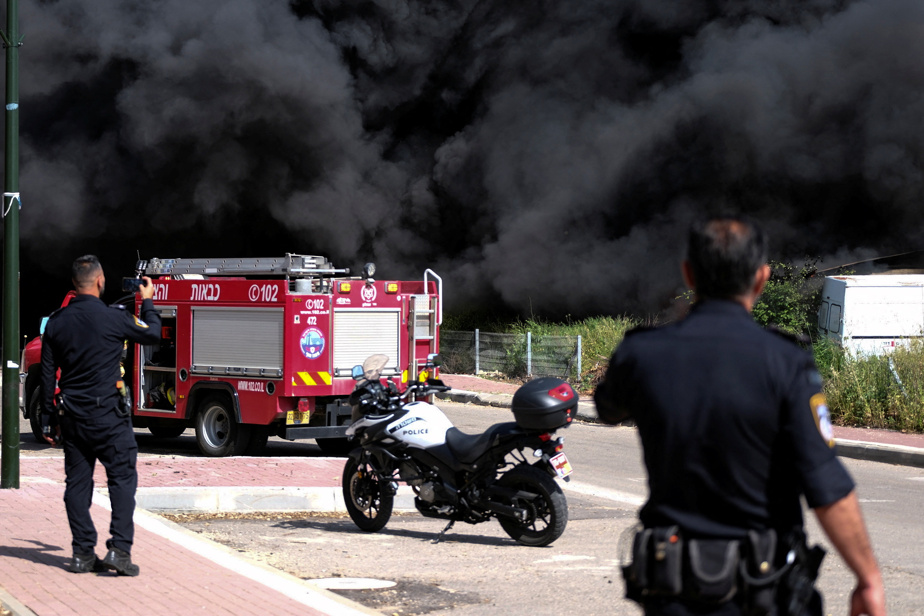(Fassūta) Israel promised a military response on Thursday evening after the firing of more than 30 rockets from Lebanon, an episode marking a conflagration of the Israeli-Lebanese front unparalleled since 2006.
The Israeli army has accused Palestinian militants of being behind the shooting, which injured at least one person and caused property damage on the day of Passover.
This outburst of violence, which prompted condemnations and calls for restraint, comes the day after the brutal irruption, in the middle of Ramadan, of the Israeli police in the Al-Aqsa mosque in Jerusalem, the third holiest site in Islam, widely denounced by neighboring countries and to which several Palestinian groups have promised a response.
“We will strike our enemies and they will pay the price for every attack,” Israeli Prime Minister Binyamin Netanyahu said at the opening of a meeting of the restricted security cabinet.
Prior to the meeting, Israeli Defense Minister Yoav Gallant had asked the army “to prepare all possible responses”.
Israel and Lebanon remain technically in a state of war after various conflicts, and the ceasefire line is monitored by the United Nations Interim Force in Lebanon (UNIFIL), deployed in southern Lebanon to ensure that peace is maintained. truce.
The Lebanese Foreign Ministry assured that Lebanon wanted to preserve “calm and stability” in the south, calling on the international community to “put pressure on Israel to stop the escalation”.
According to the IDF, “34 rockets were fired from Lebanese territory,” five of which landed in Israel and 25 were intercepted by air defense.
The army also reported the firing of mortar shells from Lebanon on the vicinity of the Israeli town of Metula, on the border, without mentioning casualties.
The Israeli army is certain that the unclaimed rocket attacks from Lebanon were “Palestinian”: “It could be Hamas, it could be Islamic Jihad, we are still trying to come to a final conclusion on this point , but it wasn’t Hezbollah,” a military spokesman said.
Lebanese Prime Minister Najib Mikati said he refused “any escalation from his territory”.
Deeming the situation “extremely serious”, UNIFIL called for “restraint and avoiding further escalation”.
The Lebanese army said that “several rockets were fired from the vicinity of the localities of Qlailé, Zebqine and Maaliyé” in the south of the country towards Israel.
She said she “discovered and dismantled rocket launch pads” containing several ready-to-launch projectiles near the first two locations. “The army is patrolling the area, in close coordination with UNIFIL.”
In Fassuta, an Arab village in northern Israel two kilometers from the demarcation line, an AFP reporter saw a blackened rocket base lying on the roadway and a damaged car.
About twenty kilometers to the west, in Shlomi, AFP journalists saw offices riddled with impacts after the explosion of a device that left its mark in the middle of the road.
“It was terrifying,” but “that’s the reality in Israel,” said Noy Atias, 21, saying he heard no less than five explosions.
Earlier Thursday, Hezbollah proclaimed its support for “all measures” that Palestinian armed groups might take against Israel by “strongly denouncing the assault by Israeli occupation forces” on the Al-Aqsa Mosque.
Hezbollah, which effectively controls southern Lebanon, has good relations with Gaza’s ruling Hamas and the Palestinian Islamic Jihad.
Visiting Lebanon, Hamas leader Ismail Haniyeh said Palestinians would “not stand idly by” in the face of Israel’s “aggression” against Al-Aqsa Mosque.
“If the Zionists think that they can defile the Al-Aqsa mosque, they must understand […] that this could set the whole region on fire”, warned Hashem Safieddine, a leader of Hezbollah, quoted by the chain of the movement.
Two rockets were fired Wednesday evening from the Gaza Strip into Israeli territory, following similar fire the previous night to which Israel responded with strikes. And Thursday at dawn, seven surface-to-air missiles fired from the Gaza Strip exploded in flight, without there being any need to intercept them, according to the Israeli army.
Paris condemned “indiscriminate” firing targeting Israel and called for “respect for the historic status quo at holy sites in Jerusalem”, while Washington recognized “Israel’s legitimate right to defend itself against any form of aggression”. . UN Secretary General Antonio Guterres called for “maximum restraint”.
Lebanon’s last rocket fire at Israel was in April 2022. Thursday’s firings mark the biggest escalation since the 2006 war between Israel and Hezbollah, which left more than 1,200 Lebanese dead, mostly civilians, and 160 on the Israeli side, mostly military.

